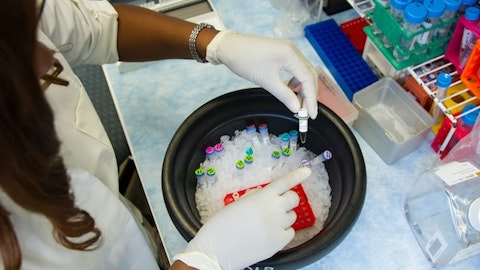And so that should be felt pretty neatly after that. And the reason that’s so important, and again what we’ve learned in our market research and the time we’ve been spending with the reps is that the case management for this product due to the prep of the product is really difficult. And so if you can improve that and what the VAN does, it not only improves the sterility issue, but it also improves the pool of the product and just the mechanism of it, if you will, it really simplifies that. And we think that will really help us with the case management piece, allowing our reps to spend less time in the OR, sort of handling through surgeries and getting some other positions and expanding and growing the product. And so it makes that problem much better.
And then ultimately, as we move towards a prefilled syringe — the beauty of the prefilled syringe — that it really — it’s just as simple as it takes the device aspect out of the drug. So instead of us being a device-drug type of combination, we become just a drug. If you look at our drug on a clinical — just clinically versus other things around the market, it really does have a superior play there as far as the clinical data and what it does and so forth. And that’s where we get really a lot of good feedback, which is why we’re so positive on this.
Nicholas Lorusso: That’s very helpful. And then just sort of a follow-up question. On — so you mentioned that the sNDA that in January will lead to about 13 million procedures in total now with everything. How many of those would then be orthopedic procedures? And yes?
Ryan Craig: Yes. So probably — this is Ryan, Craig. So out of the additional 5 million to 6 million procedures, probably about 70% of them are going to be ortho. And so that’s what — when Craig was speaking to our traction, we’ve got 60% of our current business on ZYNRELEF is orthopedic procedures as well. So assume as we gain approval — anticipated approval by the end of January should be a seamless communication point for us. That’s where we’ve had the most success to-date, and it’s obviously aligned to our strategy as well.
Nicholas Lorusso: Got it. Thanks very much.
Craig Collard: Thank you. Thanks, Nicholas.
Operator: Your next question comes from the line of Serge Belanger from Needham & Company. Your line is live.
Serge Belanger: Hi, this is Serge. A couple of follow-up questions on ZYNRELEF. I assume the orthopedic focus mostly consists of knee and hip surgeries. Curious what you’re competing against now? Is it generic bupivacaine or Exparel? And then with the label expansion, what additional orthopedic procedures do you expect that will allow you to target once we get past January, assuming approval?
Craig Collard: Yes. So I think you’re right from a competitive standpoint. I mean, it’s typically bupivacaine or Exparel, a lot of times now with Exparel being a nerve block-type scenario. So that could be an anesthesiologist is involved in that. But the beauty of this product is that once it’s used and the clinical results are shown, we really do get a lot of buy in from the orthopedic surgeons. And so we’ve had our most — really, the most success there. And the other piece that’s probably worth mentioning is that this is where you have the majority of real pain events within surgery. Hip and knee can be extremely painful. So again, we think our product is very conducive for that space. In a funny way though, yes, that’s our competitors.
But again, our issue is not as much with the competitors clinically as it has been the own prep of our product. And that’s why I continue to stress demand and so forth. And so with the expanded label, we immediately — we hope will pick up shoulders. And so that will be a direct — any physician who’s doing orthopedic can move right into shoulders with our products, that should be immediate. And then we feel like closely related will hopefully be spine, which again takes us to a different physician group, but a very similar category as far as an area we think we can do quite well with.
Serge Belanger: Okay. And then in terms of potential partnership, you view that as a kind of a nice to have or a priority going forward?
Craig Collard: No, it’s a priority. Yes, it’s a great question because, again, going back — I know I keep repeating myself, but the prep of the product and so forth is that if you think about drug reps in general, they are generally not in OR suite. However, in OR suites, specifically the ortho space suites are the medical device reps. They base all these surgeries. And so for us, we’ve done this in a few different territories and had success where we have a partnership with a distributor rep. So our view is if we did that on a national basis and could get let’s say, a group of 500 or 600 representatives that could complement and be there for case management, it’s just an absolutely huge win for us, especially as you look at introducing demand, which should improve upon that anyway. And so to us, it makes all the sense in the world. It is a priority.




